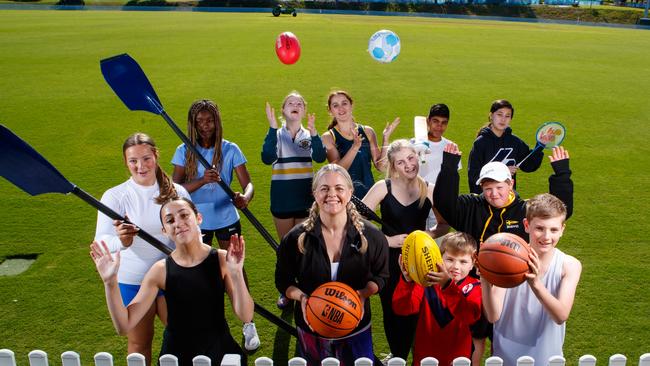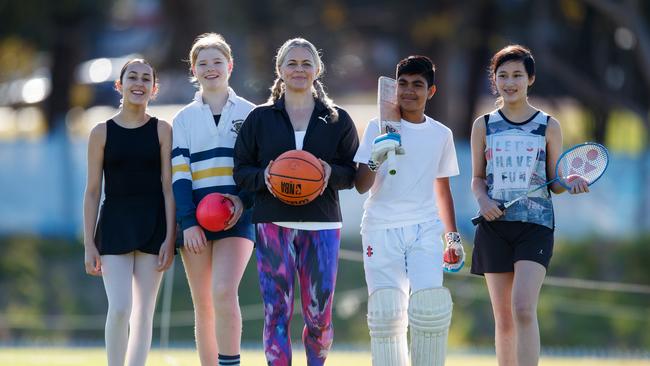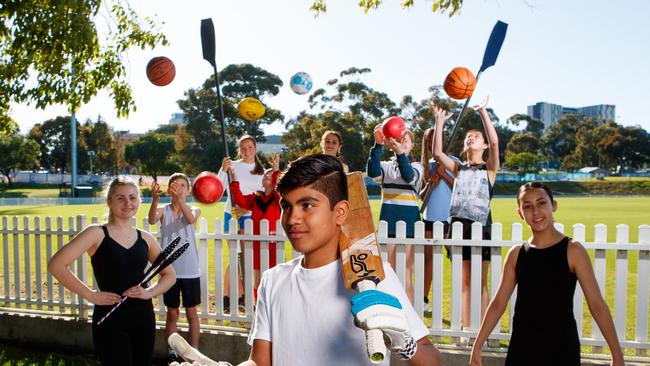Common phrases banned from kids’ sports field to avoid body shaming
Telling a child athlete they’re “big for their age” may soon be a thing of the past as parents and coaches are given tips to ensure kids of all shapes feel comfortable. Have your say.

Health
Don't miss out on the headlines from Health. Followed categories will be added to My News.
Coaches and parents are being told to stop using phrases such as “you’re big for your age”, and provide a variety of uniform sizes, so children of all body shapes feel comfortable playing sport.
The Embrace Collective, campaigning to reduce stigma, judgement and discrimination on the basis of appearance, today released a free guide for those running community sports groups about what to say and what not to say to kids in sports clubs.

The guide, called the Embrace Sport Playbook, recommends common phrases such as, “You’re big for your age, so we’ll put you in goals/defence”, be avoided.
Instead it suggests something like, “You have great presence on the field! What positions would you like to try?”
Even something like, “You looked great out there,” can make children feel self-conscious about their bodies. The guide says a better option is, “Your hard work paid off in
that powerful shot!”.
The playbook also recommends that sports clubs offer a range of outfits as part of the uniform – including a variety of sizes, and alternative items, such as shorts as well as dresses, for sports such as netball.
Embrace Collective co-executive director and Australian of the Year Taryn Brumfitt said body shaming, or feeling judged or embarrassed about their shape, is a major reason why kids are choosing to drop out of sports.

“There is an urgent need for a cultural shift to create an inclusive environment that encourages players to stay in their sport for longer,” Ms Brumfitt said.
Australian Sports Commission CEO Kieren Perkins, who wrote the foreword to the guide, said it was “a timely and important reminder that sport should never focus on what we look like while we play – sport should always be about having fun”.
A UK study found six in 10 girls reported ‘feeling judged’ as a significant barrier to engaging in sport and physical activity.
It also found 44 per cent of boys and 65 per cent of girls agreed that they don’t like others
watching them play.
Many readers have written in with their responses to this story below. Have you say in the comments.
Dancing, gymnastics and swimming were among the top sports where kids reported they felt body conscious.
Hallie Anderson, 17, from Adelaide, said she developed a negative body image after joining a rowing club.
“I did not feel like I fitted as comfortably into the boats as the other girls,” Hallie, who has just finished her Year 12 exams, said. “I was constantly comparing myself with others.”
She suffered in silence for four years until there was a moment which allowed her to express how she was feeling to the coach. Within a couple of minutes he had adjusted the seating in the boat.

“It was a stupidly easy fix,” Hallie said.
Not only did she physically feel more comfortable, her rowing improved.
Now she is coaching other young rowers and wants to make sure every girl, even if their body is a “little bit different from everybody else’s”, to feel comfortable while participating in the sport.
She said knowing how to talk sensitively about body shapes and “not making a big deal of it” should be a crucial part of any coach’s repertoire and something that could help make all sports more inclusive.
Go to theembracehub.com to get the free guide.
More Coverage
Originally published as Common phrases banned from kids’ sports field to avoid body shaming





